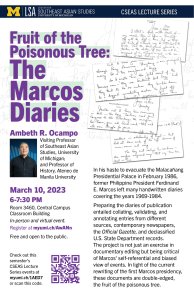Presented By: Center for Southeast Asian Studies
CSEAS Lecture Series. Fruit of the Poisonous Tree: The Marcos Diaries
Ambeth R. Ocampo, Visiting Professor of Southeast Asian Studies, University of Michigan; and Professor of History, Ateneo de Manila University

In his haste to evacuate the Malacañang Presidential Palace in February 1986, former Philippine President Ferdinand E. Marcos left many handwritten diaries covering the years 1969-1984. While the originals are in the custody of the Presidential Commission on Good Government, unofficial copies have been circulating for years.
Preparing the diaries of publication entailed collating, validating, and annotating entries from different sources, contemporary newspapers, the Official Gazette, and declassified U.S. State Department records. The project is not just an exercise in documentary editing but being critical of Marcos’ self-referential and biased view of events. In light of the current rewriting of the first Marcos presidency, these documents are double-edged, the fruit of the poisonous tree.
Ambeth R. Ocampo is a public historian whose research covers the 19th-century Philippines—its art, culture, and the people who figure in the birth of the nation. Professor and former chairman of the Department of History at the Ateneo de Manila University, Professor Ocampo writes “Looking Back,” the longest-running editorial page column on history for the Philippine Daily Inquirer. To read his articles, visit https://opinion.inquirer.net/column/looking-back.
Professor Ocampo has published over 35 books, the most recent being: Queridas de Rizal: Looking Back 16 and Yaman: History and Heritage in Philippine Money, which was shortlisted for the 2022 National Book Award for History. He served as president of the City College of Manila; president of the Philippine Historical Association; co-chair of the Manila Historical and Heritage Commission; chairman of the National Historical Commission of the Philippines; and chairman of the National Commission for Culture and the Arts. In another life, he was a Benedictine monk known as Dom. Ignacio Maria, OSB. He now moderates growing Facebook, Instagram, and YouTube channels.
This is an in-person and virtual event. Register at http://myumi.ch/AwANn
Preparing the diaries of publication entailed collating, validating, and annotating entries from different sources, contemporary newspapers, the Official Gazette, and declassified U.S. State Department records. The project is not just an exercise in documentary editing but being critical of Marcos’ self-referential and biased view of events. In light of the current rewriting of the first Marcos presidency, these documents are double-edged, the fruit of the poisonous tree.
Ambeth R. Ocampo is a public historian whose research covers the 19th-century Philippines—its art, culture, and the people who figure in the birth of the nation. Professor and former chairman of the Department of History at the Ateneo de Manila University, Professor Ocampo writes “Looking Back,” the longest-running editorial page column on history for the Philippine Daily Inquirer. To read his articles, visit https://opinion.inquirer.net/column/looking-back.
Professor Ocampo has published over 35 books, the most recent being: Queridas de Rizal: Looking Back 16 and Yaman: History and Heritage in Philippine Money, which was shortlisted for the 2022 National Book Award for History. He served as president of the City College of Manila; president of the Philippine Historical Association; co-chair of the Manila Historical and Heritage Commission; chairman of the National Historical Commission of the Philippines; and chairman of the National Commission for Culture and the Arts. In another life, he was a Benedictine monk known as Dom. Ignacio Maria, OSB. He now moderates growing Facebook, Instagram, and YouTube channels.
This is an in-person and virtual event. Register at http://myumi.ch/AwANn